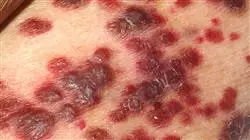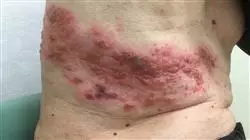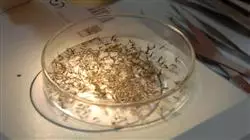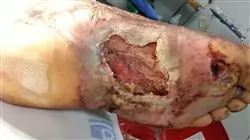University certificate
The world's largest faculty of medicine”
Description
TECH's advanced master’s degree in Clinical Infectious Diseases will allow you to acquire the most up-to-date knowledge in all areas of this specialty; a special program, of greater intensity, duration and formative impact, created to provide a highly qualified response to the most demanding professionals"

2020 will always be known as the year of Covid-19. The outbreak of the new coronavirus, with the large number of victims worldwide, has only highlighted the vulnerability of weak health systems to the infectious disease.
Looking at the figures, we can see that around 17.3 million people died from infections in 2016, with the most common causes of death being from lower respiratory infections (3.7 million), malaria (2.2 million), tuberculosis (1.3 million), diarhhea (1.3 million) and HIV/AIDS (1.1 million).
The most important factors to take into consideration in relation to infectious diseases are demographics and human behavior, technological and industrial development, economic development and variations in land use, intercontinental travelling and commerce, climate change, microbiotic adaptation and finally the disapperance or reduction of efficient public health measures.
When several of these conditions are combined, not one area of the planet goes untouched. And the spread of imported or apparently eradicated infectious diseases becomes more than possible. The recent Covid-19 pandemic has proved just that.
The complex international epidemiological situation so far this century, exemplified by the deliberate release of bacillus anthracis spores as a weapon of bioterrorism to cause pulmonary anthrax in victims who inhaled them, the emergence of West Nile virus as a pathogen in the United States, the epidemic of severe acute respiratory syndrome (SARS), the zoonotic spread of monkeypox in the United States, the threat of pandemic influenza, the Ebola epidemic in Africa, the emergence of yellow fever cases in Angola, coupled with the re-emergence of Dengue and Cholera, the emergence of new arboviruses in the Americas region, such as Chikingunya and more recently Zika, together with morbidity from other endemic infectious diseases, such as HIV/AIDS infection, leptospirosis, tuberculosis, community-acquired pneumonia and the increase in antibiotic resistance with the development of multidrug-resistant bacteria, and, of course, Covid-19, put the burden of disease on the region, Covid-19, of course, highlight the unprecedented need to improve the process of qualification and improvement of human capital in order to increase the competence and performance of all the personnel necessary to face the challenges involved in the control and confrontation of biological, hospital and public health emergencies that guarantee the quality and safety of healthcare for the population in any part of the world.
An advanced master’s degree in Clinical Infectious Diseases which provides the professional with all the advances from across the world related to Clinical Infectious Diseases with the objective of boosting healthcare competencies in dealing with these types of diseases”
This advanced master’s degree in Clinical Infectious Diseases contains the most complete and up-to-date scientific program on the market. The most important features include:
- Clinical cases presented by experts in the different specialties. The graphic, schematic, and practical contents with which they are created, provide scientific and practical information on the disciplines that are essential for professional practice
- Latest innovations on diagnosis, intervention, treatment and new materials
- Presentation of practical workshops on techniques and procedures
- Real high-resolution images in demonstrations
- Practical Exercises where the Self-assessment Process can be carried out in order to improve learning
- An algorithm-based interactive learning system for decision-making in the clinical situations presented throughout the course
- All of this will be complemented by theoretical lessons, questions to the expert, debate forums on controversial topics, and individual reflection assignments
- Content that is accessible from any fixed or portable device with an Internet connection
This advanced master’s degree is an exceptional opportunity to specialize in this area. The most comprehensive program in the online teaching market, with an exhaustive journey through each and every aspect of Clinical Infectious Diseases Intervention and the quality provided by TECH, the world’s largest online university”
The program’s teaching staff includes professionals from the field who contribute their work experience to this educational program, as well as renowned specialists from leading societies and prestigious universities.
The multimedia content, developed with the latest educational technology, will provide the professional with situated and contextual learning, i.e., a simulated environment that will provide immersive education programmed to learn in real situations.
This program is designed around Problem-Based Learning, whereby the professional must try to solve the different professional practice situations that arise during the course. For this purpose, the students will be assisted by an innovative interactive video system created by renowned and experienced experts.
Increase your decision-making confidence by updating your knowledge through this advanced master’s degree program created to specialize the best professionals"

Make the most of this opportunity and learn about the latest advances in Clinical Infectious Diseases and improve your patient care, offering them the latest treatments and most innovative techniques: the most guaranteed way to position yourself among the best"
Objectives
This advanced master’s degree in Clinical Infectious Diseases is aimed at offering a complete, detailed and up-to-date vision of Clinical Infectious Diseases, incorporating all the advances on a global level, both in the field of technology and in action protocols and new lines of investigation. With a special focus on the area of antibiotic therapy in the treatment of infectious diseases.

This advanced master’s degree has been designed so that you can acquire or update your knowledge of Clinical Infectious Diseases fluently, efficiently and confidently, allowing you to work with the most state-of-the-art techniques in any situation and with any type of patient”
General Objectives
- Update and gain in-depth knowledge and develop your skills for daily clinical practice in healthcare, teaching or research roles in the field of infectious diseases in order to provide individual or group population care that allows for the improvement of health indicators
- Improve the medical attention and the overall health of patients with infectious diseases based on integral care, the application of the epidemiological clinical method and the correct use of antimicrobials in correspondence with the most up to date scientific evidence
Specific Objectives
Module 1. Clinical Research in Infectious Diseases
- Know the principles of the clinical method in the process of the diagnosis of infectious diseases
- Manage epidemiology in the study of infectious diseases
- Know how to deal with epidemic outbreaks
Module 2. Microbiological Diagnosis and Other Examinations for Infectious Diseases
- Understand the organization, structure and operation of the microbiology laboratory
- Integrate the principles of the use of microbiological examinations in patients with infectious pathologies
- Correctly perform protocols for virological, bacteriological, mycological and parasitological studies
- Properly interpret microbiological studies
Module 3. The Immune System in Infections in the Immunosuppressed Host
- Comprehend the structure and development of the immune system, its composition, which organs compose it and its chemical mediators
- Master the immune response to viral and bacterial infections
- Identify the most frequent clinical manifestations of immunosuppression and febrile syndrome in neutropenic patients
Module 4. Main Elements of Infectious Diseases
- Update the main and basic concepts of the infectious health-disease process, as well as the stages of the infectious process
- Identify the most frequent symptoms and signs in patients with infectious diseases
- Manage the types of fever that can occur in different situations and their most frequent complications
- Describe septic shock based on its clinical manifestations and differential features
Module 5. Viral and Antiviral Diseases
- Develop the principles of virology and understand the epidemiology of viral infections
- Study the different types of viral hemorrhagic diseases, arbovirosis, herpetic or exanthematous viral
- Detect the main antivirals for respiratory infections and understand how their mechanism of action works
Module 6. Latest Information on Coronavirus Infections
- In-depth and detailed study of latest scientific evidence on the development and expansion of SARS-CoV-2
- Justify the importance of controlling coronavirus diseases to reduce global morbidity and mortality
- Highlight the role of immunity in Coronavirus infections and their complications
- Highlight the role of Zoonoses by Coronavirus as a major global health problem
- Highlight the development of vaccines for the prevention of coronavirus infections
- Emphasize the development of future antivirals and other therapeutic modalities for coronavirus infections
- Emphasize the future challenges of infectious diseases in reducing infectious morbidity and mortality caused by coronavirus
Module 7. HIV/AIDS Infection
- Determine the epidemiology of HIV and its morbidity globally and by geographic region
- Identify the main groups vulnerable to this infection
- Associate major and minor opportunistic diseases and to know the application for their prophylaxis
- Provide comprehensive care for people living with HIV/AIDS based on the Cuban Model
Module 8. Bacterial Diseases and Antimicrobials
- Manage the fundamental concepts of use in Bacteriology
- Treat different types of bacterial skin infections
- Describe the clinical features of community-acquired pneumonia, its diagnosis, and treatment
- Know the clinical characteristics of tuberculosis, its diagnosis and treatment
- Point out the clinical characteristics of urinary tract and gynecological infections in women, their diagnosis and treatment
- Learn in depth the structure and therapeutic uses of penicillins and beta-lactamase inhibitors
Module 9. Fungal Diseases
- Review general concepts in mycology and superficial fungal infections
- Incorporate knowledge of deep and frequent fungal infections
- Understand the most frequent fungal infections such as cryptococcosis, histoplasmosis, aspergillosis, among others
- Describe in each case the epidemiology, pathogenesis, complications and treatment of the most frequent mycotic infections
Module 10. Parasitic and Tropical Diseases
- Understand the general concepts used in parasitology and the classification of parasites
- Identify the diagnosis, pathogenesis, diagnosis and treatment of diseases such as malaria or intestinal protozoan diseases
- Assess the epidemiology and global situation of filarial diseases, describing their main types
- Apply pharmacokinetics and pharmacodynamics to different parasitic and tropical diseases such as antiprotozoal or helminth antiparasitic drugs
Module 11. Nosocomial Infections Associated with Healthcare and Patient Safety
- Recognize surgical site infection through in-depth knowledge of its definition, epidemiology, most frequent germs and therapeutic conduct
- Identify nosocomial pneumonia associated with mechanical ventilation, establishing the general concepts, epidemiology, risk factors, etiology, diagnosis, prevention and most commonly used antibiotics
- Understand the Infection Associated with Non-Tunneled Peripheral and Central Venous Catheters and Urinary Catheters
- Know how to apply the main internationally recommended universal measures for nosocomial infection control
Module 12. Antimicrobial Resistance
- Establish epidemiology from the molecular to the socioeconomic level
- Gain an in-depth understanding of the genetic and acquired mechanisms of antimicrobial resistance
- Identify viral, fungal and parasitic resistance and their therapeutic alternatives
- Gain up-to-date knowledge based on the global program for the control of antimicrobial resistance and research on new antibiotics
- Assess the objectives and actions of the global program for the control of antimicrobial resistance
Module 13. The Correct Use of Antimicrobials
- Apply the use of antimicrobials in special host situations
- Describe the role of rational antibiotic utilization policies and programs and their impact on antimicrobial resistance and the cost of medical care
- Know the functioning of pharmacotherapeutic committees as tools for the control and evaluation of the use of antibiotics
Module 14. The Role of Infectologists in Health Services
- Describe Infectious Diseases and its importance for medical care in the area of any specialty
- Acquire the infectologist competencies and skills necessary for higher qualification
- Contextualize the functions of the infectologist in the health team at the different levels of the health system
Module 15. Epidemiology and Microbiology of Infectious Diseases
- Know the epidemiological, economic, social and political conditions of countries with major infectious diseases
- Identify the different taxonomies of infectious agents, as well as the properties of microorganisms
- Gain in-depth knowledge of chemical and physical agents in microorganisms
- Know the indications and interpretations of a microbiological study, understanding all the technical aspects
Module 16. Cancer and Immunosuppression
- Identify the general structures of the immune system
- Establish the common responses of the immunological system when faced with viral and bacterial infections
- Explain the complex interrelationships between infections and different types of immunosuppression
Module 17. Occupational Accident and Blood-Borne Pathogens
- Address the important role of microbiology and the infectologist in the control of infectious diseases
- Describe the main elements that favour occupational accidents and the transmission of blood-borne pathogens
- Analyze the diagnostic and therapeutic approach to accidents involving blood
Module 18. Infections in the International Traveller
- Highlight the importance of morbidity and mortality due to infections in international travelers
- Explain the health controls for international travellers
- Know and identify the most common infections for international travellers such, as “fever on returning from a trip ” or “traveller’s diarrhea”
Module 19. Chronic Non-Communicable Diseases and Infections
- Study the current pathophysiological elements between non-transmissible chronic diseases and infections
- Know the neurological, endocrine and immune interrelationships in the face of stress and infectious agents
- Identify the digestive diseases associated with infectious microorganisms and the function of system in the body
- Gain in-depth knowledge on the infectious theory of rheumatic diseases
Module 20. The Most Lethal Respiratory Infections
- Study, in depth, the latest clinical, diagnostic and therapeutic elements of the most lethal respiratory infections
- Know the mortal repercussions of bacterial pneumonia associated with health care and other factors
- Identify the clinical picture, pathobiology and diagnosis of tuberculosis
- Analyze the formation of Loeffler syndrome in its pulmonary phase and the clinical manifestations
Module 21. Urinary Tract and Sexually Transmitted Infections
- Assess the extent of urinary tract infections and immune response in the genitourinary system
- Know in detail the urinary tract infections in patients with bladder catheter, prostate and elderly
- Identify and know the latest updates on STIs, as well as the main pathologies of this group according to their classification into viral and bacterial
- Analyze the current approach to herpes and the therapeutic alternatives that have gained the most popularity among specialists
Module 22. Food-Borne Infections
- Gain knowledge of diseases transmitted by the consumption and mishandling of food
- Identify and analyze the classifications of infections caused by improperly handled food
- Evaluate the main etiological agents such as salmonella, staphylococcus, among others
- Understand the socio-economic measures taken by ATS for the control of foodborne infections
Module 23. Hepatitis and HIV/AIDS and Tuberculosis Co-Infection
- Characterize the clinical picture, viral markers, evolution and treatment of Hepatitis, Tuberculosis and HIV/AIDS infection
- Understand in detail the clinical manifestations of co-infection at pulmonary and extrapulmonary levels
- Evaluate the comprehensive care received by patients with infections, patients with co-infection, and therapeutic considerations
- Consider other antituberculosis treatments in patients with tuberculosis/HIV/AIDS coinfection
Module 24. Viral Haemorrhagic Diseases and Arboviruses
- Quickly identify viral hemorrhagic diseases and the vaccines that target these diseases
- Be able to understand the diagnostic approach to hemorrhagic diseases
- Get an overview of the types of hemorrhagic infections that concern the world, such as dengue, chikungunya, zika, among others
Module 25. Central Nervous System Infections
- Quickly identify the defense mechanisms of the CNS immune system, as well as the epidemiology of the infections that affect it
- Diagnose possible microbes that cause CNS infections by studying cerebrospinal fluid
- Identify the basic infections of the CNS by means of their most relevant characteristics, such as etiology and clinical picture, as well as propose a correct diagnosis and treatment
- Gain a clear understanding of antibiotics and how the blood-brain barrier works
Module 26. Zoonotic
- Understand the most important aspects of zoonoses, such as their origin and prion causes
- Identify and analyze the main control measures for zoonoses of concern to public health systems worldwide
- Be able to establish an accurate diagnostic picture of some of the infections transmitted by animals, as well as their treatments and clinical pictures
Module 27. Mycobacteriosis and Anaerobic Infections
- Acquire the skills required to analyze the microbiological characteristics of mycobacteria
- Analyze microbiological methods to diagnose mycobacterial infections
- Know and identify the symptoms, infectious agents and clinical picture of mycobacterial infections
- Know in detail the main antimicrobials used against anaerobic germs
Module 28. Mycoses and Parasitosis in Infectious Diseases
- Be able to identify the etiology of the most common mycosis infections
- Understand, in detail, the most important aspects of parasitosis, as well as the body’s immune response to parasites, protozoa and helminths
- Correctly manage the different direct and indirect diagnostic methods for mycoses
- Know the latest updates on antiparasitics and their pharmacological components
Module 29. Multi-Resistance and Vaccines
- Identify the acquired genetic mechanisms that lead to antimicrobial resistance
- Further understanding of the different infections that have developed resistance to antiviral drugs
- Know the general aspects of vaccination, as well as its immunological basis, its production process and the risk for people
- Establish the correct method for the use of vaccines
Module 30. Rare Infectious Diseases and Other Challenges in Infectious Diseases
- Know the general aspects of the most common infectious diseases in the world
- Identify the etiology, clinical picture and diagnosis of the most common diseases in the world
- Develop the skills required to identify new emerging infectious diseases, as well as the development of new antibiotics

Our goal is to help you achieve yours, through a very unique program that will become an unparalleled professional growth experience"
Advanced Master's Degree in Clinical Infectious Diseases
The emergence of multiple infectious diseases highlights the need for highly trained professionals to meet the challenges involved in the control and prevention of biological, hospital and public health emergencies. In order to improve the skills and performance of medical personnel during epidemiological alarm cases, at TECH Global University we have developed the Advanced Master's Degree in Clinical Infectious Diseases, a specialization program based on comprehensive care, the application of the clinical epidemiological method and the correct use of antimicrobials in accordance with the most updated scientific evidence. If you want to provide your knowledge and skills safely, with guarantees and offering the latest techniques and treatments to your patients, take advantage of this opportunity.
Specialize in the largest Faculty of Medicine
Through our Advanced Master's Degree you will receive theoretical and practical training in the most important aspects of the field of infectology, as well as in the effective application of clinical-epidemiological and antimicrobial techniques. You will deepen in the study of the latest clinical, diagnostic and therapeutic elements of the different types of infections, including respiratory, central nervous system and sexually transmitted infections; you will know how to explain the complex interrelationships between infections and the different types of immunosuppression and you will identify the pathogenic mechanisms and the most frequent neoplasms associated with infectious agents. At TECH Global University you will have within reach a program designed with the highest quality standards in the academic sector so that you can implement prevention and control methods supported by the latest scientific evidence. Studying at the largest School of Medicine is the next step to fulfill your professional goals and projects.







